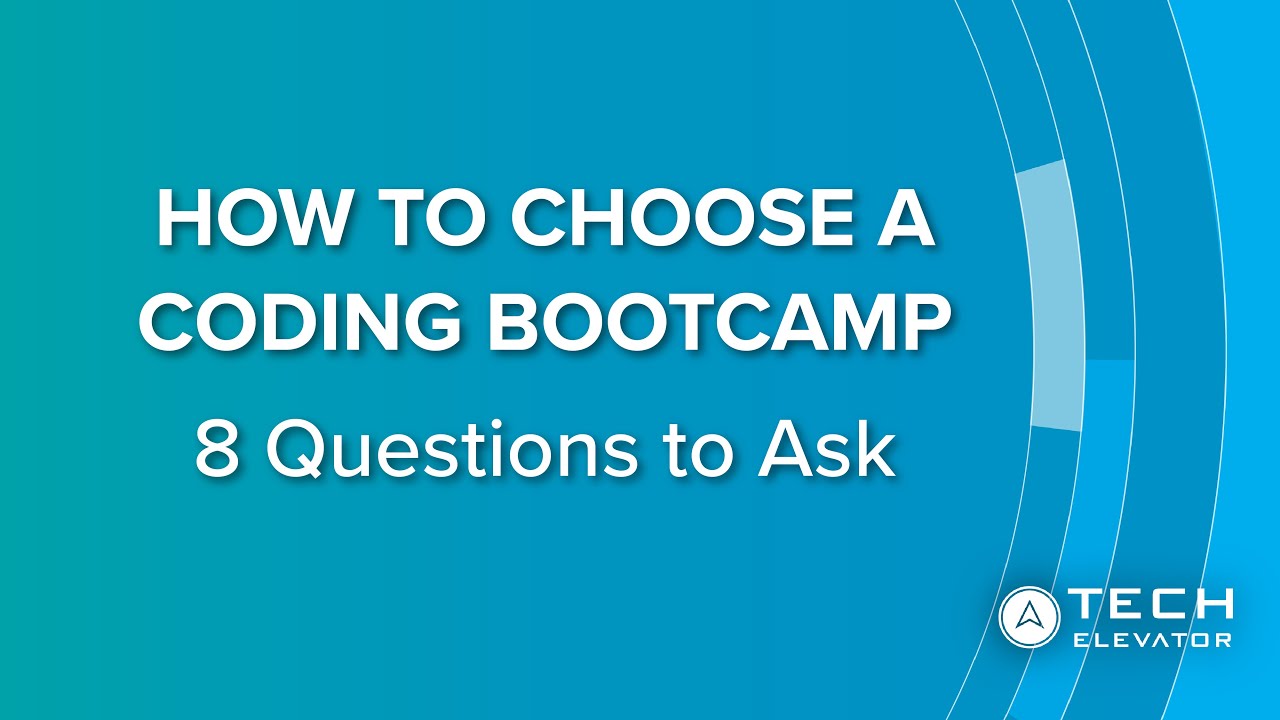Curriculum and Technology Focus: How To Pick A Coding Bootcamp

Choosing a coding bootcamp requires careful consideration of its curriculum and the specific technologies taught. The curriculum should directly support your career goals, ensuring you graduate with the skills employers demand. A mismatch between the bootcamp’s focus and your aspirations can significantly hinder your job search after graduation.
The importance of aligning a bootcamp’s curriculum with career aspirations cannot be overstated. A bootcamp specializing in data science will offer a vastly different skill set than one focused on web development. Investing time and resources in a program that doesn’t equip you with the necessary skills for your target role is a significant risk. Therefore, thorough research into the curriculum and its relevance to your chosen career path is crucial.
Popular Programming Languages and Technologies
Many popular coding bootcamps incorporate a range of programming languages and technologies into their curriculum. These often include, but aren’t limited to, languages like JavaScript, Python, Java, C++, and Ruby, along with frameworks such as React, Angular, Node.js, and Spring. Database technologies like SQL and NoSQL databases (e.g., MongoDB) are also commonly included, along with cloud platforms such as AWS, Azure, or Google Cloud. The specific technologies offered vary greatly depending on the bootcamp’s specialization and target career paths.
Curriculum Breakdown of Three Bootcamps
To illustrate the variations in bootcamp curricula, let’s examine three hypothetical examples, focusing on their strengths and weaknesses. Note that these are illustrative examples and do not represent specific existing bootcamps.
| Bootcamp | Curriculum Focus | Strengths | Weaknesses |
|---|---|---|---|
| CodeCraft Academy | Full-Stack Web Development (JavaScript, React, Node.js, SQL) | Strong focus on in-demand technologies, comprehensive curriculum covering front-end and back-end development, robust career services. | Limited exposure to other programming languages, potentially less suitable for those interested in data science or mobile development. |
| DataWise Institute | Data Science (Python, SQL, Machine Learning, Data Visualization) | Specialized curriculum ideal for aspiring data scientists, strong emphasis on practical projects using real-world datasets. | May lack depth in other areas of software development, potentially limiting career options outside of data science. |
| MobileMasters Academy | Mobile App Development (Swift, Kotlin, React Native) | Focus on building mobile applications for iOS and Android platforms, strong practical component with hands-on app development projects. | Limited exposure to web development or other programming paradigms, potentially less versatile for graduates seeking broader opportunities. |
Cost and Financing Options

Choosing a coding bootcamp involves a significant financial commitment, so understanding the costs and available financing options is crucial. The total expense can vary greatly depending on factors such as the bootcamp’s location, reputation, curriculum length, and the level of career services provided. Careful consideration of these factors, alongside your personal financial situation, will help you make an informed decision.
The typical cost range for coding bootcamps in the United States is between $10,000 and $20,000, though some programs can cost significantly more or less. Bootcamps in major metropolitan areas like New York City or San Francisco tend to be more expensive than those in smaller cities. Programs focusing on specialized or in-demand technologies might also command higher tuition fees. Longer programs naturally cost more due to the increased instruction time. Finally, bootcamps that offer extensive career support services, like resume building workshops and job placement assistance, often have higher price tags reflecting the added value.
Tuition Costs and Influencing Factors
Several key factors influence the overall cost of a coding bootcamp. Location plays a significant role; bootcamps in high-cost-of-living areas will generally reflect higher tuition. The intensity and duration of the program are also important; intensive, full-time programs are usually more expensive than part-time options. The specific technologies taught also impact pricing; bootcamps focusing on cutting-edge or highly specialized technologies might charge more due to the expertise required from instructors and the advanced resources needed. Finally, the reputation and job placement success rate of a bootcamp can affect its tuition. Bootcamps with a strong track record of placing graduates into high-paying jobs may command higher fees.
Financing Options for Coding Bootcamps
Fortunately, several financing options are available to help aspiring developers cover the costs of a coding bootcamp. Many bootcamps offer their own financing plans, allowing students to pay tuition in installments over several months or years. This often involves a manageable monthly payment schedule, reducing the immediate financial burden. Additionally, various student loan options exist, either through private lenders or federal programs (if eligible). These loans can provide a significant amount of funding, but it’s important to carefully review the terms and interest rates to avoid accumulating excessive debt.
Scholarships and Grants, How to pick a coding bootcamp
Many organizations offer scholarships and grants specifically designed to support individuals pursuing coding bootcamps. These scholarships can significantly reduce the overall cost of tuition and are often based on merit, financial need, or specific demographic criteria. Some bootcamps themselves offer merit-based scholarships to high-achieving applicants. Furthermore, numerous non-profit organizations and tech companies provide grants and scholarships for underrepresented groups in the tech industry. It’s worthwhile to research and apply for as many scholarships as possible to maximize your financial aid opportunities.
Resources for Finding Financial Aid
Several resources can help you locate and apply for financial aid for coding bootcamps. Websites such as Course Report and Tech Elevator often list available scholarships and grants. Directly contacting the bootcamp’s financial aid office is also advisable, as they can provide information about internal scholarships and payment plans. Furthermore, exploring general scholarship databases, like those offered by Fastweb or Scholarships.com, can reveal additional opportunities that may not be specifically targeted towards coding bootcamps. Finally, contacting professional organizations related to your desired tech field can uncover specialized funding opportunities.
Job Placement and Career Services

Choosing a coding bootcamp involves careful consideration of its post-graduation support. A strong job placement program is crucial for maximizing your investment and ensuring a smooth transition into a tech career. The bootcamp’s commitment to career services directly impacts your chances of securing a job after graduation.
The importance of a bootcamp’s job placement rate and alumni network cannot be overstated. A high job placement rate suggests a successful track record in connecting graduates with employers. This rate, however, should be viewed critically, as it can be influenced by various factors. A robust alumni network provides invaluable support, connecting graduates with mentors, potential employers, and peers who have already navigated the job search process. This network offers ongoing professional development opportunities and fosters a sense of community.
Effective Career Services Offered by Coding Bootcamps
Successful bootcamps provide a comprehensive suite of career services designed to prepare graduates for the job market. These services typically include resume and portfolio reviews, mock interviews, career counseling, and networking events. Some bootcamps even offer personalized job search strategies, including assistance with identifying suitable job postings and tailoring applications to specific roles. For instance, a bootcamp might offer workshops on how to effectively use LinkedIn for professional networking or provide access to a dedicated career counselor who provides one-on-one guidance throughout the job search process. Another example is a bootcamp that partners with tech companies to provide exclusive access to job openings or internship opportunities.
Evaluating the Credibility of Job Placement Claims
It is essential to scrutinize a bootcamp’s job placement claims to ensure their accuracy and transparency. Look for verifiable data, such as independently audited job placement rates and detailed breakdowns of graduate employment outcomes. Be wary of bootcamps that only provide vague statistics or rely on self-reported data. Request specific examples of companies that have hired their graduates and consider contacting alumni directly to inquire about their experiences with the job placement services. For example, a bootcamp might claim a 90% job placement rate, but if they do not provide supporting documentation or clarify the timeframe for this data, the claim is less credible. Instead, look for bootcamps that provide detailed reports outlining graduate salaries, job titles, and the companies where they are employed. Transparency in this area is a strong indicator of a reputable program.
Accreditations and Reviews
Choosing a coding bootcamp is a significant investment of time and money, so it’s crucial to thoroughly research the program’s credibility and the experiences of past students. Understanding the significance of accreditations and carefully examining reviews will help you make an informed decision. This section will guide you through evaluating these critical aspects.
Accreditations and certifications provide a measure of assurance regarding a bootcamp’s quality and legitimacy. They indicate that the program has met specific standards and undergone an independent evaluation process. While not all bootcamps are accredited, the presence of accreditation suggests a commitment to providing a high-quality education and adhering to best practices. This can positively influence your job prospects, as some employers prefer candidates from accredited programs.
Bootcamp Accreditation Significance
Accreditation signifies that a bootcamp has met specific educational standards set by an accrediting body. These bodies typically assess factors such as curriculum rigor, instructor qualifications, student support services, and job placement outcomes. Examples of accrediting bodies include the Council on Occupational Education (COE) and the Accrediting Commission of Career Schools and Colleges (ACCSC). Accreditation provides a level of accountability and transparency, giving prospective students more confidence in the program’s quality. A lack of accreditation doesn’t automatically disqualify a bootcamp, but it’s a factor to consider, prompting further investigation into the program’s reputation and outcomes.
Interpreting Bootcamp Reviews and Testimonials
Online reviews and testimonials offer valuable insights into the student experience at a coding bootcamp. However, it’s essential to approach these reviews critically, recognizing that they can be subjective and potentially biased. Look for reviews that provide specific details about the curriculum, instructors, career services, and overall learning experience. Pay attention to recurring themes and consistent feedback, rather than isolated positive or negative comments. Consider the source of the review; reviews from reputable platforms with verification processes are generally more trustworthy than those from less established sources.
Identifying Credible Sources of Bootcamp Reviews
Several platforms provide student reviews for coding bootcamps. Course Report, SwitchUp, and Reddit’s r/codingbootcamps are examples of websites where you can find reviews. These platforms often have mechanisms to verify the authenticity of reviews, such as requiring email verification or linking reviews to social media profiles. While these platforms strive for objectivity, it’s still wise to read a range of reviews and consider the overall trend of feedback rather than relying on individual comments. Be wary of websites or blogs that seem overly promotional or contain only positive reviews, as these may be biased or sponsored. Looking for a balanced representation of both positive and negative experiences is key to gaining a comprehensive understanding.


Tim Redaksi